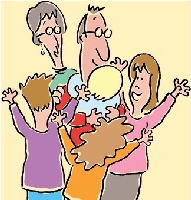 Creating Your Caregiving Team
Creating Your Caregiving Team
Providing elder care is one of the most challenging tasks people face in their lives. Many caregivers attempt to go it alone, thinking they can do it all. In some cases, there may be siblings who are unable or unwilling to pitch in, leaving it up to one family member to provide all caregiving services.
Whatever the case, caring for the elderly is a demanding responsibility that should not be assumed by just one person; it requires multiple people to chip in to meet the many needs of the senior citizen.
Surviving the caregiving process without having a complete physical or emotional breakdown is no small feat. Forming an alliance of people on whom you can rely for support, guidance, resource information, and respite care is essential to the caregiver's overall health; this is what is meant by forming a
Caregiving Team.
In addition, there is a significant reason to form this type of caregiving group: different people who provide these caregiving services may meet the elder's needs in ways you may not.
Here is how this worked for me: When providing caregiving duties for my mother, I contacted the Area Agency on Aging in my state when I realized that she needed more care than I could provide. Three ladies (angels sent from heaven) appeared, each of whom met a different need in my mother.
The first caregiver was about my mother's age and took charge. She was a cancer survivor and had a great attitude about life. I could see that my mother's depression lifted a great deal when she was around. It was fantastic to see my mother engage socially with someone her own age.
The second lady caring for my mother had a nursing background. She could explain to my mother what was going on medically and also had an understanding of the psychological impact of illness. As my mother was talking about her illness, she broke down, and this caregiver provided the type of empathy and sympathy that she needed. I stood back, listening in wonder, as my mother opened up to this lady in a way that I could not have even anticipated.
The third person providing caregiving services for my mother was studying to become a psychologist. She was very skilled at getting my mother to talk about her anger and grief about her illness; then she would validate my mother's feelings. During one especially traumatic time when my mother was rushed off to the emergency room--one of many such trips-- she helped me as well, which was very therapeutic. She drove me to the emergency room, and while driving, said, "Let it out Mary, let it all out before we get to the ER." I did so, crying and venting all the way there. This allowed me to be more objective, function better at the hospital, and make better overall healthcare decisions for my mother, who ended up undergoing emergency surgery that day but succumbed to a systemic infection less than a month later.
I will never forget the triumvirate of caregiving angels who helped me get through the unrelenting strain of caring for my mother who has been gone for more than 14 years now, although the experience seems like it just happened yesterday. I thoroughly enjoyed taking care of my mother. It was an experience I wouldn't trade for a million bucks, and I survived it with the help of what I like to call my
Caregiving Team.
Taking care of yourself, first and foremost, is absolutely essential when providing elder care. The rewards and challenges of caring for an elder are equally as great, so make arrangements to get respite care and tap into the various resources you need so you will survive the experience.
(This is an edited version of an article by Mary Ruff-King, who has been in the throes of caregiving situations, each one presenting different challenges and opportunities for personal growth.
)